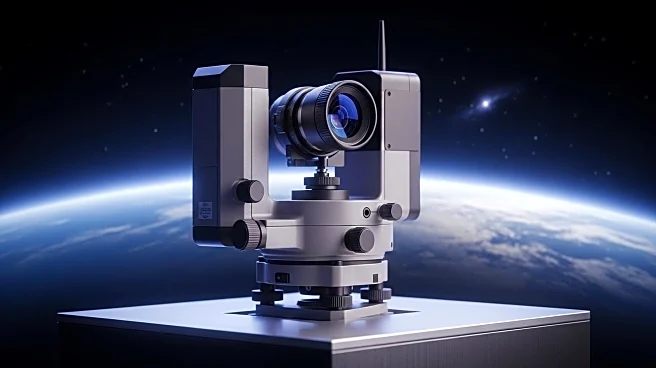What's Happening?
A recent experiment conducted at the Geodetic Observatory Wettzell in Potsdam, Germany, has achieved unprecedented accuracy in measuring Earth's axial wobble, known as nutation and precession. Utilizing a ring laser, the experiment surpassed previous gyroscope and ring laser technologies by a factor of 100. The ring laser directly and continuously measured various influences on Earth's axis, including its imperfect shape and solar and lunar gravitational forces, with sub-hourly temporal resolution and immediate data availability. Unlike previous methods that relied on networks of radio telescopes, this single, relatively small, underground ring laser instrument independently performed these measurements. The results of the 250-day experiment were published in the journal Science Advances, highlighting the unique capabilities of the ring laser in providing precise measurements of Earth's fluctuations.
Why It's Important?
The enhanced precision in measuring Earth's axial wobble has significant implications for geodesy and the understanding of Earth's system. Accurate measurements of these fluctuations can improve models of Earth's dynamics, which are crucial for various scientific and practical applications, including navigation and climate studies. Furthermore, the ability to measure spacetime distortion caused by Earth's rotation could provide a direct test of Einstein's theory of relativity, including the Lense-Thirring effect. This advancement in measurement technology could lead to new insights into fundamental physics and enhance our understanding of gravitational forces and their impact on Earth.
What's Next?
Future improvements in the accuracy of the ring laser measurements are anticipated, with a potential increase by a factor of 10. This could enable direct measurement of spacetime distortion caused by Earth's rotation, offering a direct test of Einstein's theory of relativity. The scientific community may focus on further refining the technology and exploring its applications in testing fundamental physics theories. Additionally, the results could influence future research in geodesy and related fields, potentially leading to new discoveries about Earth's dynamics and gravitational interactions.
Beyond the Headlines
The development of this precise measurement technology also raises ethical and cultural considerations regarding the use of advanced scientific instruments. As technology continues to evolve, the balance between scientific exploration and the potential impacts on society and the environment must be carefully managed. The implications of testing fundamental physics theories could also lead to philosophical discussions about the nature of reality and our understanding of the universe.









